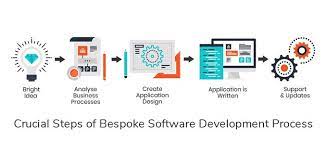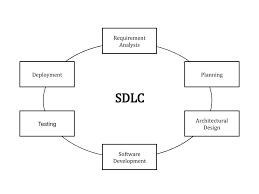In today’s rapidly evolving digital landscape, businesses are constantly seeking innovative solutions to streamline their operations and gain a competitive edge. One such solution that has gained significant popularity is bespoke application development.
Bespoke applications, also known as custom applications, are tailor-made software solutions designed to meet the specific requirements of a business. Unlike off-the-shelf software that offers generic features, bespoke applications are built from scratch to address unique challenges and align with the organization’s goals.
The key advantage of bespoke applications lies in their ability to provide a highly personalized user experience. By understanding the intricacies of a business’s processes and workflows, developers can create an application that seamlessly integrates with existing systems and enhances efficiency. This level of customization ensures that businesses can maximize productivity and minimize operational bottlenecks.
Another significant benefit of bespoke applications is their scalability. As businesses grow and evolve, their software needs may change as well. Off-the-shelf software often falls short in adapting to these changes, leading to limitations and inefficiencies. In contrast, bespoke applications can be easily modified and expanded as per the evolving needs of the business, ensuring long-term sustainability.
Security is another critical aspect where bespoke applications excel. With increasing concerns about data breaches and cyber threats, businesses need robust security measures in place to protect sensitive information. Bespoke applications enable organizations to incorporate stringent security protocols tailored specifically for their operations, reducing vulnerabilities and safeguarding valuable data.
Furthermore, by investing in bespoke application development, businesses gain a competitive advantage by differentiating themselves from their competitors. These tailored solutions allow organizations to stand out in the market by offering unique features or functionalities that cater directly to their target audience’s needs.
While off-the-shelf software may seem like a cost-effective option initially, it often comes with hidden expenses such as licensing fees or additional modules needed for customization. In contrast, while bespoke application development may require a higher upfront investment, it offers long-term cost savings by eliminating unnecessary features and focusing solely on what the business requires.
Collaborating with a reputable bespoke application development company is crucial to ensure the success of such projects. Experienced developers will work closely with businesses to understand their objectives, challenges, and desired outcomes. This partnership ensures that the final product aligns perfectly with the business’s needs and delivers tangible results.
In conclusion, bespoke applications have become a game-changer for businesses seeking tailored software solutions. From enhancing productivity and scalability to bolstering security and gaining a competitive edge, these custom-built applications offer numerous benefits. By investing in bespoke application development, businesses can unlock their full potential and pave the way for future growth in today’s digital era.
5 Essential Tips for Creating a Tailored Bespoke Application
- Research the company thoroughly before creating a bespoke application to ensure that your application meets their needs and expectations.
- Make sure to include relevant examples of your work that demonstrate your skills and experience in the area.
- Pay attention to detail when crafting a bespoke application as it should be tailored specifically for the role you are applying for.
- Be sure to highlight any unique qualifications or experiences that make you stand out from other applicants in the field.
- Follow up with the employer after submitting your application to show them how interested you are in the position and reiterate why you would be an ideal fit for it.
Research the company thoroughly before creating a bespoke application to ensure that your application meets their needs and expectations.
When it comes to developing a bespoke application for a company, thorough research is essential to ensure that the final product meets their needs and expectations. This tip holds significant importance in the success of any custom software development project.
Before diving into the development process, it is crucial to have a deep understanding of the company’s operations, workflows, and pain points. Conducting thorough research allows developers to gain insights into the unique challenges faced by the organization and identify areas where a bespoke application can make a difference.
By researching the company thoroughly, developers can align their goals with those of the business. This alignment ensures that the application addresses specific requirements and provides targeted solutions. It eliminates any guesswork and ensures that both parties are on the same page throughout the development process.
Moreover, researching the company helps developers grasp the company’s culture and brand identity. This knowledge enables them to design an application that not only meets functional requirements but also reflects the company’s values and enhances its overall image.
Additionally, understanding the target audience is vital when creating a bespoke application. Researching their preferences, behaviors, and expectations allows developers to incorporate features and functionalities that resonate with users. This user-centric approach ensures high adoption rates and user satisfaction.
Thorough research also helps in anticipating future needs and scalability requirements. By gaining insights into the company’s growth plans or industry trends, developers can build flexibility into the application’s architecture. This foresight ensures that as the business evolves, so does its custom software solution.
Finally, researching potential pitfalls or challenges specific to the industry or market segment helps in mitigating risks early on in the development process. By identifying potential roadblocks beforehand, developers can proactively find solutions or workarounds, saving time and resources in later stages.
In conclusion, conducting thorough research before embarking on bespoke application development is crucial for success. It allows developers to gain a comprehensive understanding of the company’s needs, expectations, target audience, culture, and future plans. This knowledge empowers them to create a custom software solution that not only meets the company’s requirements but also aligns with its vision and goals. By investing time in research, businesses can ensure that their bespoke application is a perfect fit for their unique needs and sets them up for long-term success.
Make sure to include relevant examples of your work that demonstrate your skills and experience in the area.
When it comes to showcasing your expertise in bespoke application development, one essential tip is to include relevant examples of your work that demonstrate your skills and experience in the area. This practice not only helps potential clients or employers gauge your capabilities but also builds trust and confidence in your abilities.
Including relevant examples of your work allows you to highlight specific projects where you have successfully developed bespoke applications tailored to meet unique business requirements. It provides tangible evidence of your proficiency and demonstrates how you can create custom solutions that address specific challenges.
For instance, if you have developed a bespoke application for a retail company that streamlined their inventory management system, mention the specific features you implemented such as real-time stock updates, automated reordering, or integration with point-of-sale systems. Highlighting measurable results such as reduced stock-outs or improved order accuracy further strengthens your case.
Similarly, if you have created a bespoke application for a healthcare organization that enhanced patient data management and privacy, showcase the security measures you implemented such as encryption protocols, access controls, or compliance with industry regulations like HIPAA. Quantify the impact by mentioning improvements in data accuracy or time saved on administrative tasks.
By providing concrete examples of your work, potential clients or employers can visualize how your skills align with their needs. It allows them to assess whether your expertise matches their requirements and whether they can trust you to deliver similar results for their business.
When presenting examples of your work, consider using various formats such as case studies, project portfolios, or even interactive demos if feasible. These formats help convey the scope of the project, the challenges faced, and the innovative solutions implemented. Include screenshots or videos that showcase key features and functionalities to provide a comprehensive understanding of what you have accomplished.
Remember to ensure confidentiality and respect any non-disclosure agreements when sharing examples of your work. If necessary, seek permission from clients before showcasing their projects publicly. This demonstrates professionalism and safeguards client relationships.
In summary, including relevant examples of your work is a powerful way to showcase your skills and experience in bespoke application development. It allows potential clients or employers to assess your capabilities, builds trust, and provides concrete evidence of your ability to create custom solutions that address specific challenges. So, gather your best examples, highlight key features and results, and present them in a format that effectively communicates the value you can bring to prospective projects.
Pay attention to detail when crafting a bespoke application as it should be tailored specifically for the role you are applying for.
When it comes to crafting a bespoke application, paying attention to detail is of utmost importance. A bespoke application should be tailored specifically for the role you are applying for, reflecting your qualifications, skills, and experiences in a way that aligns perfectly with the job requirements.
The first step in creating a tailored bespoke application is thoroughly researching the company and the specific role you are interested in. Take the time to understand the company’s values, mission, and culture. This will help you highlight relevant experiences and skills that resonate with their needs.
Next, carefully review the job description and identify key requirements and qualifications sought by the employer. Use this information as a guide when crafting your bespoke application. Make sure to emphasize how your unique skill set directly aligns with what they are looking for.
When it comes to writing your bespoke application, pay attention to every detail. Start with a strong opening statement that grabs the reader’s attention and clearly states your intent. Use concise language to highlight your relevant experience and achievements, focusing on those that directly relate to the role you are applying for.
Tailor each section of your bespoke application to showcase how your skills and experiences make you an ideal candidate for the specific position. Be specific about projects or tasks you have completed that demonstrate your expertise in areas relevant to the role. Use quantifiable results whenever possible to showcase your impact.
Don’t forget about formatting and presentation. Ensure that your bespoke application is well-structured, easy to read, and error-free. Pay attention to grammar, spelling, and punctuation as even small mistakes can leave a negative impression on potential employers.
Finally, before submitting your bespoke application, take the time to review it multiple times. Consider seeking feedback from trusted friends or mentors who can provide valuable insights or catch any overlooked errors.
In conclusion, crafting a bespoke application requires meticulous attention to detail. By tailoring it specifically for the role you are applying for and paying attention to every aspect, you can create a compelling application that stands out from the competition. Remember, the devil is in the details, and by focusing on them, you can increase your chances of securing your desired position.
Be sure to highlight any unique qualifications or experiences that make you stand out from other applicants in the field.
When it comes to applying for a job in the field of bespoke application development, it’s essential to showcase what sets you apart from other candidates. Highlighting your unique qualifications and experiences can make a significant difference in capturing the attention of potential employers.
Employers in the bespoke application industry are often seeking individuals with a diverse skill set and a track record of success. When crafting your resume or cover letter, be sure to emphasize any specialized training or certifications you have obtained that are relevant to the field. This could include specific programming languages, frameworks, or development methodologies that you are proficient in.
Additionally, if you have worked on notable projects or have experience with specific industries or sectors, make sure to highlight those achievements. Employers are often interested in candidates who can bring domain expertise to their projects. By showcasing your experience working on applications tailored for specific industries such as healthcare, finance, or e-commerce, you demonstrate your ability to understand and address unique challenges within those sectors.
Furthermore, don’t overlook any unique experiences that may set you apart from other applicants. Have you participated in hackathons, open-source projects, or contributed to the development community? These activities demonstrate your passion for continuous learning and growth within the field.
Lastly, soft skills such as communication abilities and teamwork should not be overlooked. The ability to effectively communicate complex technical concepts and collaborate with cross-functional teams is highly valued in bespoke application development roles. Highlight instances where you have successfully collaborated with designers, project managers, or clients to deliver exceptional results.
In summary, when applying for a job in bespoke application development, remember to showcase any unique qualifications or experiences that differentiate you from other applicants. Highlighting specialized training, domain expertise, notable projects, contributions to the development community, and strong soft skills will help employers recognize your value and increase your chances of standing out among competitors in this competitive field.
Follow up with the employer after submitting your application to show them how interested you are in the position and reiterate why you would be an ideal fit for it.
In the competitive job market, it’s crucial to go the extra mile to make a lasting impression on potential employers. One effective tip when applying for a position is to follow up with the employer after submitting your application. This simple gesture not only demonstrates your enthusiasm for the role but also gives you an opportunity to reiterate why you would be an ideal fit for the position.
Following up shows that you are proactive and genuinely interested in the opportunity. It sets you apart from other candidates who may have submitted their applications and simply waited for a response. By taking the initiative to reach out, you demonstrate your commitment and dedication to securing the position.
When following up, it’s important to be professional and courteous. Craft a concise and well-written email expressing your gratitude for the opportunity to apply and reiterating your interest in the role. Highlight key qualifications or experiences that make you a strong candidate, emphasizing how they align with the requirements of the position.
Additionally, use this opportunity to address any additional information or questions that may have arisen since submitting your application. If there are any updates or relevant achievements that could strengthen your candidacy, mention them briefly but confidently.
Timing is crucial when following up. Wait a reasonable amount of time after submitting your application before reaching out, typically around one week. This allows employers sufficient time to review applications while still demonstrating your eagerness without appearing impatient.
Remember to personalize each follow-up email based on the specific position and company you’re applying to. Generic messages can come across as insincere or disinterested. Take some time to research the company further and incorporate specific details into your email, showing that you’ve done your homework and are genuinely invested in their organization.
While following up does not guarantee immediate success, it showcases your proactive nature and dedication as a potential employee. It keeps you on employers’ radars and shows them that you are willing to put in extra effort throughout the hiring process.
In conclusion, following up after submitting your application is a valuable tip that can significantly enhance your chances of securing a job. By expressing your interest, reiterating your qualifications, and demonstrating professionalism, you stand out as a committed candidate who is genuinely interested in the position. So don’t hesitate to take that extra step and follow up – it could make all the difference in landing your dream job.




